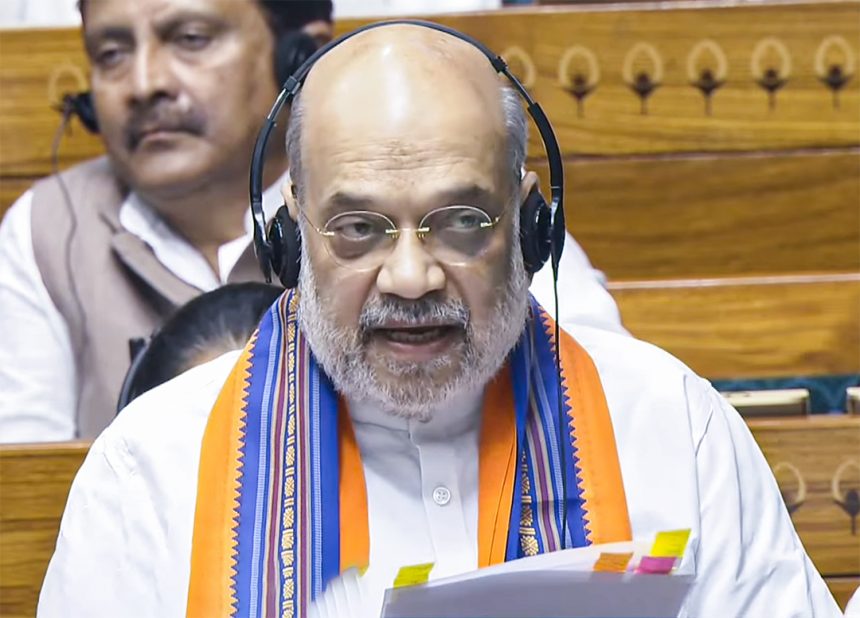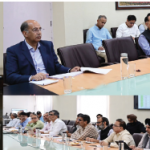Jammu, Aug 20 : Union Home Minister Amit Shah on Wednesday introduced three landmark bills in the LokSabha, including the Jammu and Kashmir Reorganisation (Amendment) Bill, 2025, aimed at enforcing stricter provisions for the removal of elected ministers held in custody on serious criminal charges.
Alongside the J&K Amendment Bill, Shah also tabled The Constitution (One Hundred and Thirtieth Amendment) Bill, 2025, and The Government of Union Territories (Amendment) Bill, 2025 during the ongoing Monsoon Session of Parliament. These legislations seek to establish a uniform legal framework to address cases involving ministers, including the Prime Minister, Chief Ministers, and Union Territory ministers, who are under judicial custody for grave offences.
Under the proposed J&K Reorganisation Amendment Bill, any minister remaining in custody continuously for 30 days on charges punishable with imprisonment of five years or more would face removal from office.
The Constitution Amendment Bill is particularly significant, as it aims to prevent individuals holding key constitutional offices, such as the Prime Minister, Chief Ministers, and other ministers at the Centre and states, from retaining their positions if arrested and jailed.
Addressing the House, Shah said the move underscores the Modi government’s “unwavering commitment to fight political corruption” and responds to public outrage over ministers continuing in office while incarcerated.
“The purpose of this bill is to elevate the declining standards of morality in public life and bring integrity to politics,” Shah asserted.
According to the proposed legislation, any serving Prime Minister, Chief Minister, or Minister who remains in jail and fails to secure bail within 30 days of arrest would be removed by the Prime Minister or Chief Minister, or be automatically disqualified from carrying out constitutional duties.
Following the introduction, Shah moved a motion to refer all three bills to a Joint Parliamentary Committee (JPC), which was accepted without division. The JPC, comprising members from both the LokSabha and RajyaSabha, will conduct a detailed, clause-by-clause examination, seek expert opinions, and submit its report ahead of the next parliamentary session.
While introducing the bill, Shah launched a scathing critique of the opposition, accusing them of opposing the legislation to shield corrupt leaders and maintain power despite legal proceedings.
“Despite clear intent to place the bills before the JPC, the opposition resorted to crude and indecent behaviour to protect corrupt individuals, thereby exposing themselves before the people,” he said.
Highlighting recent instances where jailed Chief Ministers or Ministers allegedly ran governments without resigning, Shah questioned the propriety of governing “from behind bars.” He emphasised that the framers of the Constitution never envisaged such a scenario, stressing the urgent need to restore the dignity of public office.
Contrasting the BJP-led government’s reformist initiative with past precedents, Shah recalled the Emergency-era 39th Constitutional Amendment enacted by the Congress, which shielded then Prime Minister Indira Gandhi from legal scrutiny. “That amendment reflected the opposition’s intent to keep the Prime Minister above the law. In contrast, this amendment seeks to ensure that even the highest office in the country is not immune,” he remarked.
Responding to personal allegations from an opposition leader concerning his own arrest, Shah clarified, “I resigned before my arrest. Even after being granted bail, I did not accept any constitutional position until fully acquitted by the court,” reiterating that the case against him was dismissed as politically motivated.
The bills are expected to spark intense debate in Parliament, with the opposition branding them politically motivated, while the government maintains they represent crucial reforms to uphold constitutional morality and public trust.







